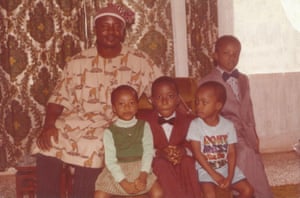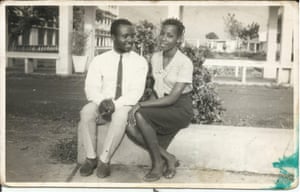'People will forgive you for being wrong, but they will never forgive you for being right - especially if events prove you right while proving them wrong.' Thomas Sowell
Search This Blog
Friday, 12 July 2024
Saturday, 8 June 2024
Friday, 12 April 2024
Wednesday, 17 January 2024
Friday, 12 January 2024
What is the world's loveliest language?
From The Economist
Linguists tend to say that all languages are valuable, expressive and complex. They usually attribute negative attitudes to prejudice and politics. That is probably why no one has carefully studied the touchy question of which ones are seen as beautiful or ugly.
That is until three scholars—Andrey Anikin, Nikolay Aseyev and Niklas Erben Johansson—published their study of 228 languages last year*. They hit upon the idea of using an online film about the life of Jesus, which its promoters have recorded in hundreds of languages. Crucially, most recordings had at least five different speakers, as the film has both exposition and dialogue. The team recruited 820 people from three different language groups—Chinese, English and Semitic (Arabic, Hebrew and Maltese speakers)—to listen to clips and rate the languages’ attractiveness.
What they found was that nearly all the 228 languages were rated strikingly similarly—when certain factors were controlled for (of which more below). On a scale of 1 to 100, all fell between 37 and 43, and most in a bulge between 39 and 42 (see chart 1). The highest-rated? Despite the supposed allure (at least among Anglophones) of French and Italian, it was Tok Pisin, an English creole spoken in Papua New Guinea. The lowest? Chechen. The three language groups broadly coincided in their preferences. But the differences between the best and worst-rated languages were so slight—and the variation among individual raters so great—that no one should be tempted to crown Tok Pisin the world’s prettiest language with any authority.
A few factors did make the raters say they quite liked the languages they heard. But those seem unrelated to intrinsic qualities. First, being familiar with a language—or even thinking they were familiar with it—made raters give a language a 12% prettiness boost on average. And there seemed to be some regional prejudices. If a rater said that a language was familiar, he or she was asked to say what region it came from. Chinese raters, for example, clearly preferred languages they thought to be from the Americas or Europe, and rated those they thought from sub-Saharan Africa lower. (When raters said they were unfamiliar with the languages, such preferences disappeared.)

The other extrinsic factors that influenced ratings were a strong preference for female voices and a weaker preference for deeper and breathier ones (see chart 2). But try as they might, the investigators could not find an inherent phonetic feature—such as the presence of nasal vowels (as in French bon vin blanc) or fricative consonants (like the sh and zh sounds common in Polish)—that was consistently rated as beautiful. Only a slight dislike for tonal languages was statistically significant. Tonal languages are those that use pitch to distinguish otherwise homophonous words. Even Chinese subjects slightly disliked such languages, though Chinese itself is tonal.
Dr Johansson highlights some unanswered questions. His team had no information about which sounds tend to appear together (English strings along consonants—as in “strings”—in a way that many other languages do not.) Such a feature was beyond their ability to measure. So was prosody—roughly, the rhythm of a language. And with just five speakers per language, the presence of a couple of attractive or unattractive individual speakers could easily move a language’s rating this way or that.
Finally, the audio materials were scripted. This was a good thing in one way, because the raters heard the same part of the film (with the same meanings) in each language. But spontaneous, natural speech could make quite a different impression. Perhaps people like and dislike not the sound inventory of a language, but the way its speakers tend to speak it. If that is so, the attractiveness of a language might be better attributed to its speakers’ culture—not to the language itself.
Negative results in experiments usually do not make waves, but this one is both interesting—since it goes so strongly against people’s instincts—and cheering. The world is divided enough. As the researchers conclude, “We have emphasised the fundamental phonetic and aesthetic unity of world languages.”
Saturday, 16 December 2023
Tuesday, 2 May 2023
AI has hacked the operating system of human civilisation
Fears of artificial intelligence (ai) have haunted humanity since the very beginning of the computer age. Hitherto these fears focused on machines using physical means to kill, enslave or replace people. But over the past couple of years new ai tools have emerged that threaten the survival of human civilisation from an unexpected direction. ai has gained some remarkable abilities to manipulate and generate language, whether with words, sounds or images. ai has thereby hacked the operating system of our civilisation.
Language is the stuff almost all human culture is made of. Human rights, for example, aren’t inscribed in our dna. Rather, they are cultural artefacts we created by telling stories and writing laws. Gods aren’t physical realities. Rather, they are cultural artefacts we created by inventing myths and writing scriptures.
Money, too, is a cultural artefact. Banknotes are just colourful pieces of paper, and at present more than 90% of money is not even banknotes—it is just digital information in computers. What gives money value is the stories that bankers, finance ministers and cryptocurrency gurus tell us about it. Sam Bankman-Fried, Elizabeth Holmes and Bernie Madoff were not particularly good at creating real value, but they were all extremely capable storytellers.
What would happen once a non-human intelligence becomes better than the average human at telling stories, composing melodies, drawing images, and writing laws and scriptures? When people think about Chatgpt and other new ai tools, they are often drawn to examples like school children using ai to write their essays. What will happen to the school system when kids do that? But this kind of question misses the big picture. Forget about school essays. Think of the next American presidential race in 2024, and try to imagine the impact of ai tools that can be made to mass-produce political content, fake-news stories and scriptures for new cults.
In recent years the qAnon cult has coalesced around anonymous online messages, known as “q drops”. Followers collected, revered and interpreted these q drops as a sacred text. While to the best of our knowledge all previous q drops were composed by humans, and bots merely helped disseminate them, in future we might see the first cults in history whose revered texts were written by a non-human intelligence. Religions throughout history have claimed a non-human source for their holy books. Soon that might be a reality.
On a more prosaic level, we might soon find ourselves conducting lengthy online discussions about abortion, climate change or the Russian invasion of Ukraine with entities that we think are humans—but are actually ai. The catch is that it is utterly pointless for us to spend time trying to change the declared opinions of an ai bot, while the ai could hone its messages so precisely that it stands a good chance of influencing us.
Through its mastery of language, ai could even form intimate relationships with people, and use the power of intimacy to change our opinions and worldviews. Although there is no indication that ai has any consciousness or feelings of its own, to foster fake intimacy with humans it is enough if the ai can make them feel emotionally attached to it. In June 2022 Blake Lemoine, a Google engineer, publicly claimed that the ai chatbot Lamda, on which he was working, had become sentient. The controversial claim cost him his job. The most interesting thing about this episode was not Mr Lemoine’s claim, which was probably false. Rather, it was his willingness to risk his lucrative job for the sake of the ai chatbot. If ai can influence people to risk their jobs for it, what else could it induce them to do?
In a political battle for minds and hearts, intimacy is the most efficient weapon, and ai has just gained the ability to mass-produce intimate relationships with millions of people. We all know that over the past decade social media has become a battleground for controlling human attention. With the new generation of ai, the battlefront is shifting from attention to intimacy. What will happen to human society and human psychology as ai fights ai in a battle to fake intimate relationships with us, which can then be used to convince us to vote for particular politicians or buy particular products?
Even without creating “fake intimacy”, the new ai tools would have an immense influence on our opinions and worldviews. People may come to use a single ai adviser as a one-stop, all-knowing oracle. No wonder Google is terrified. Why bother searching, when I can just ask the oracle? The news and advertising industries should also be terrified. Why read a newspaper when I can just ask the oracle to tell me the latest news? And what’s the purpose of advertisements, when I can just ask the oracle to tell me what to buy?
And even these scenarios don’t really capture the big picture. What we are talking about is potentially the end of human history. Not the end of history, just the end of its human-dominated part. History is the interaction between biology and culture; between our biological needs and desires for things like food and sex, and our cultural creations like religions and laws. History is the process through which laws and religions shape food and sex.
What will happen to the course of history when ai takes over culture, and begins producing stories, melodies, laws and religions? Previous tools like the printing press and radio helped spread the cultural ideas of humans, but they never created new cultural ideas of their own. ai is fundamentally different. ai can create completely new ideas, completely new culture.
At first, ai will probably imitate the human prototypes that it was trained on in its infancy. But with each passing year, ai culture will boldly go where no human has gone before. For millennia human beings have lived inside the dreams of other humans. In the coming decades we might find ourselves living inside the dreams of an alien intelligence.
Fear of ai has haunted humankind for only the past few decades. But for thousands of years humans have been haunted by a much deeper fear. We have always appreciated the power of stories and images to manipulate our minds and to create illusions. Consequently, since ancient times humans have feared being trapped in a world of illusions.
In the 17th century René Descartes feared that perhaps a malicious demon was trapping him inside a world of illusions, creating everything he saw and heard. In ancient Greece Plato told the famous Allegory of the Cave, in which a group of people are chained inside a cave all their lives, facing a blank wall. A screen. On that screen they see projected various shadows. The prisoners mistake the illusions they see there for reality.
In ancient India Buddhist and Hindu sages pointed out that all humans lived trapped inside Maya—the world of illusions. What we normally take to be reality is often just fictions in our own minds. People may wage entire wars, killing others and willing to be killed themselves, because of their belief in this or that illusion.
The AI revolution is bringing us face to face with Descartes’ demon, with Plato’s cave, with the Maya. If we are not careful, we might be trapped behind a curtain of illusions, which we could not tear away—or even realise is there.
Of course, the new power of ai could be used for good purposes as well. I won’t dwell on this, because the people who develop ai talk about it enough. The job of historians and philosophers like myself is to point out the dangers. But certainly, ai can help us in countless ways, from finding new cures for cancer to discovering solutions to the ecological crisis. The question we face is how to make sure the new ai tools are used for good rather than for ill. To do that, we first need to appreciate the true capabilities of these tools.
Since 1945 we have known that nuclear technology could generate cheap energy for the benefit of humans—but could also physically destroy human civilisation. We therefore reshaped the entire international order to protect humanity, and to make sure nuclear technology was used primarily for good. We now have to grapple with a new weapon of mass destruction that can annihilate our mental and social world.
We can still regulate the new ai tools, but we must act quickly. Whereas nukes cannot invent more powerful nukes, ai can make exponentially more powerful ai. The first crucial step is to demand rigorous safety checks before powerful ai tools are released into the public domain. Just as a pharmaceutical company cannot release new drugs before testing both their short-term and long-term side-effects, so tech companies shouldn’t release new ai tools before they are made safe. We need an equivalent of the Food and Drug Administration for new technology, and we need it yesterday.
Won’t slowing down public deployments of ai cause democracies to lag behind more ruthless authoritarian regimes? Just the opposite. Unregulated ai deployments would create social chaos, which would benefit autocrats and ruin democracies. Democracy is a conversation, and conversations rely on language. When ai hacks language, it could destroy our ability to have meaningful conversations, thereby destroying democracy.
We have just encountered an alien intelligence, here on Earth. We don’t know much about it, except that it might destroy our civilisation. We should put a halt to the irresponsible deployment of ai tools in the public sphere, and regulate ai before it regulates us. And the first regulation I would suggest is to make it mandatory for ai to disclose that it is an ai. If I am having a conversation with someone, and I cannot tell whether it is a human or an ai—that’s the end of democracy.
This text has been generated by a human.
Or has it?
Sunday, 22 January 2023
Friday, 23 December 2022
Monday, 16 August 2021
Saturday, 1 May 2021
Salman Rushdie on Midnight's Children at 40: 'India is no longer the country of this novel'
Longevity is the real prize for which writers strive, and it isn’t awarded by any jury. For a book to stand the test of time, to pass successfully down the generations, is uncommon enough to be worth a small celebration. For a writer in his mid-70s, the continued health of a book published in his mid-30s is, quite simply, a delight. This is why we do what we do: to make works of art that, if we are very lucky, will endure.
As a reader, I have always been attracted to capacious, largehearted fictions, books that try to gather up large armfuls of the world. When I started to think about the work that would grow into Midnight’s Children, I looked again at the great Russian novels of the 19th century, Crime and Punishment, Anna Karenina, Dead Souls, books of the type that Henry James had called “loose, baggy monsters”, large-scale realist novels – though, in the case of Dead Souls, on the very edge of surrealism. And at the great English novels of the 18th and 19th centuries, Tristram Shandy (wildly innovative and by no means realist), Vanity Fair (bristling with sharp knives of satire), Little Dorrit (in which the Circumlocution Office, a government department whose purpose is to do nothing, comes close to magic realism), and Bleak House (in which the interminable court case Jarndyce v Jarndyce comes even closer). And at their great French precursor, Gargantua and Pantagruel, which is completely fabulist.
I also had in mind the modern counterparts of these masterpieces, The Tin Drum and One Hundred Years of Solitude, The Adventures of Augie March and Catch-22, and the rich, expansive worlds of Iris Murdoch and Doris Lessing (both too prolific to be defined by any single title, but Murdoch’s The Black Prince and Lessing’s The Making of the Representative from Planet 8 have stayed with me). But I was also thinking about another kind of capaciousness, the immense epics of India, the Mahabharata and Ramayana, and the fabulist traditions of the Panchatantra, the Thousand and One Nights and the Kashmiri Sanskrit compendium called Katha-sarit-sagar (Ocean of the Streams of Story). I was thinking of India’s oral narrative traditions, too, which were a form of storytelling in which digression was almost the basic principle; the storyteller could tell, in a sort of whirling cycle, a fictional tale, a mythological tale, a political story and an autobiographical story; he – because it was always a he – could intersperse his multiple narratives with songs and keep large audiences entranced.
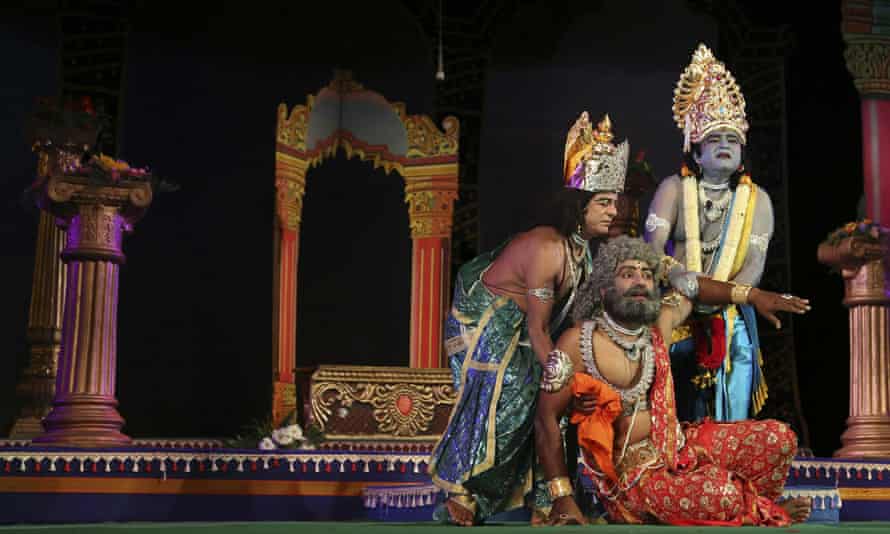
I loved that multiplicity could be so captivating. Young writers are often given a version of the advice that the King of Hearts gives the White Rabbit in Alice’s Adventures in Wonderland, when the Rabbit becomes confused in court about how to tell his story: “‘Begin at the beginning,’ the King said, very gravely, ‘and go on until you come to the end; then stop.’” It was inspiring to learn, from the oral narrative masters of, in particular, Kerala in south India, that this was not the only way, or even the most captivating way, to go about things.
The novel I was planning was a multigenerational family novel, so inevitably I thought of Thomas Mann’s Buddenbrooks and, for all its non-realist elements, I knew that my book needed to be a novel deeply rooted in history, so I read, with great admiration, Elsa Morante’s History: A Novel. And, because it was to be a novel of Bombay, it had to be rooted in the movies as well, movies of the kind now called “Bollywood”, in which calamities such as babies exchanged at birth and given to the wrong mothers were everyday occurrences.
I wanted to write a novel in which memory and politics, love and hate would mingle on every page
As you can see, I wanted to write a novel of vaulting ambition, a high-wire act with no safety net, an all-or-nothing effort: Bollywood or bust, as one might say. A novel in which memory and politics, love and hate would mingle on almost every page. I was an inexperienced, unsuccessful, unknown writer. To write such a book I had to learn how to do so; to learn by writing it. Five years passed before I was ready to show it to anybody. For all its surrealist elements Midnight’s Children is a history novel, looking for an answer to the great question history asks us: what is the relationship between society and the individual, between the macrocosm and the microcosm? To put it another way: do we make history, or does it make (or unmake) us? Are we the masters or victims of our times?
My protagonist, Saleem Sinai, makes an unusual assertion in reply: he believes that everything that happens, happens because of him. That history is his fault. This belief is absurd, of course, and so his insistence on it feels comic at first. Later, as he grows up, and as the gulf between his belief and the reality of his life grows ever wider – as he becomes increasingly victim-like, not a person who acts but one who is acted upon, who does not do but is done to – it begins to be sad, perhaps even tragic. Forty years after he first arrived on the scene – 45 years after he first made his assertion on my typewriter – I feel the urge to defend his apparently insane boast. Perhaps we are all, to use Saleem’s phrase, “handcuffed to history”. And if so, then yes, history is our fault. History is the fluid, mutable, metamorphic consequence of our choices, and so the responsibility for it, even the moral responsibility, is ours. After all: if it’s not ours, then whose is it? There’s nobody else here. It’s just us. If Saleem Sinai made an error, it was that he took on too much responsibility for events. I want to say to him now: we all share that burden. You don’t have to carry all of it.
The question of language was central to the making of Midnight’s Children. In a later novel, The Ground Beneath Her Feet, I used the acronym “Hug-me” to describe the language spoken in Bombay streets, a melange of Hindi, Urdu, Gujarati, Marathi and English. In addition to those five “official” languages, there’s also the city’s unique slang, Bambaiyya, which nobody from anywhere else in India understands. Clearly, any novel aiming for readability could not be written in Hug-me or Bambaiyya. A novel must know what language it’s being written in. However, writing in classical English felt wrong, like a misrepresentation of the rich linguistic environment of the book’s setting. In the end I took my cue from Jewish American writers such as Philip Roth, who sprinkled their English with untranslated Yiddish words. If they could do it, so could I. The important thing was to make the approximate meaning of the word clear from the context. If Roth talks about getting a zetz in the kishkes, we understand from context that a zetz is some sort of violent blow and kishkes are a sensitive part of the human body. So if Saleem mentions a rutputty motor car, it should be clear that the car in question is a ramshackle, near-derelict old wreck.
In the end I used fewer non-English words than I originally intended. Sentence structure, the flow and rhythm of the language, ended up being more useful, I thought, in my quest to write in an English that wasn’t owned by the English. The flexibility of the English language has allowed it to become naturalised in many different countries, and Indian English is its own thing by now, just as Irish English is, or West Indian English, or Australian English, or the many variations of American English. I set out to write an Indian English novel. Since then, the literature of the English language has expanded to include many more such projects: I’m thinking of Edwidge Danticat’s Creole-inflected English in Breath, Eyes, Memory, for example, or Chimamanda Ngozi Adichie’s use of Igbo words and idioms in Purple Hibiscus and Half of a Yellow Sun, or Junot Díaz’s slangy, musical, Dominican remake of the language in The Brief Wondrous Life of Oscar Wao.

I found myself in conversation, so to speak, with a great forerunner, EM Forster’s A Passage to India. I had admired this novel even before I had the great good fortune, as an undergraduate at King’s College, Cambridge, to meet Morgan Forster himself, who was in residence there as an honorary fellow, and was generously and kindly encouraging when I shyly admitted that I wanted to write. But as I began to write my “India book” – for a while I didn’t even know what it was called – I understood that Forsterian English, so cool, so precise, would not do for me. It would not do, I thought, for India. India is not cool. India is hot. It’s hot and noisy and odorous and crowded and excessive. How could I represent that on the page? I asked myself. What would a hot, noisy, odorous, crowded, excessive English sound like? How would it read? The novel I wrote was my best effort to answer that question.
The question of crowdedness needed a formal answer as well as a linguistic one. Multitude is the most obvious fact about the subcontinent. Everywhere you go, there’s a throng of humanity. How could a novel embrace the idea of such multitude? My answer was to tell a crowd of stories, deliberately to overcrowd the narrative, so that “my” story, the main thrust of the novel, would need to push its way, so to speak, through a crowd of other stories. There are small, secondary characters and peripheral incidents in the book that could be expanded into longer narratives of their own. This kind of deliberate “wasting” of material was intentional. This was my hubbub, my maelstrom, my crowd.
When I started writing, the family at the heart of the novel was much more like my family than it is now. However, the characters felt oddly lifeless and inert. So I started making them unlike the people on whom they were modelled, and at once they began to come to life. For example, I did have an aunt who married a Pakistani general, who, in real life, was one of the founders, and the first chief, of the much feared ISI, the Inter-Services Intelligence agency. But as far as I know he was not involved in planning or executing a military coup, with or without the help of pepper pots. So that story was fiction. At least I think it was.
Saleem Sinai went to my school. He also lived, in Bombay, in my childhood home, in my old neighbourhood, and is just eight weeks younger than me. His childhood friends are composites of children I knew when I was young. Once, after a reading in Bombay, a man came up to me and said: “Hello, Salman. I’m Hairoil.” He wasn’t wrong. The character of Hairoil Sabarmati, or at least Hairoil’s neatly oiled and parted hair, had indeed been based on him. But he had never been nicknamed Hairoil in real life. That was something I made up for the novel. I couldn’t help thinking how strange it was that my childhood friend introduced himself to me by a fictional name. Especially as he had lost all his hair.
 Bombay ... a hubub, a maelstrom. Photograph: Galit Seligmann/Alamy
Bombay ... a hubub, a maelstrom. Photograph: Galit Seligmann/AlamyBut in spite of these echoes, Saleem and I are unalike. For one thing, our lives took very different directions. Mine led me abroad to England and eventually to America. But Saleem never leaves the subcontinent. His life is contained within, and defined by, the borders of India, Pakistan and Bangladesh. As a final proof that my character and I are not one and the same, I offer another anecdote. When I was in Delhi to do one of the first Indian readings from Midnight’s Children, I heard a woman’s voice cry loudly as I walked out on to the stage: “Oh! But he’s got a perfectly ordinary nose!”
Forty years is a long time. I have to say that India is no longer the country of this novel. When I wrote Midnight’s Children I had in mind an arc of history moving from the hope – the bloodied hope, but still the hope – of independence to the betrayal of that hope in the so-called Emergency, followed by the birth of a new hope. India today, to someone of my mind, has entered an even darker phase than the Emergency years. The horrifying escalation of assaults on women, the increasingly authoritarian character of the state, the unjustifiable arrests of people who dare to stand against that authoritarianism, the religious fanaticism, the rewriting of history to fit the narrative of those who want to transform India into a Hindu-nationalist, majoritarian state, and the popularity of the regime in spite of it all, or, worse, perhaps because of it all – these things encourage a kind of despair.
When I wrote this book I could associate big-nosed Saleem with the elephant-trunked god Ganesh, the patron deity of literature, among other things, and that felt perfectly easy and natural even though Saleem was not a Hindu. All of India belonged to all of us, or so I deeply believed. And still believe, even though the rise of a brutal sectarianism believes otherwise. But I find hope in the determination of India’s women and college students to resist that sectarianism, to reclaim the old, secular India and dismiss the darkness. I wish them well. But right now, in India, it’s midnight again.
Thursday, 14 March 2019
‘We spoke English to set ourselves apart’: how I rediscovered my mother tongue
When I was a child, my great-grandmother, whom we called Daa, came to live with my family in Umuahia in south-eastern Nigeria. My father had spent most of his infancy in her care, mostly during a period when his mother was preoccupied with her role as one of the founders of a local Assemblies of God church. As Daa grew older and weaker, he felt it was his turn to take care of her. After much persuasion, he finally convinced her to leave her humble dwellings in a village far from where we lived and come spend her last days in the comfort of our modern home.
Each time I watched her shuffle one foot in front of the other, her back bent almost double until her head nearly touched the top of her walking stick, it was hard to imagine my father’s descriptions of a Daa who was once one of the tallest and most stunning women around. The story went that the colonial-era arbitrator who presided over the dissolution of her first marriage found her so beautiful that he decided on the spot to take her as one of his wives. “How can you maltreat such a beautiful woman?” he was said to have asked the errant husband.
Daa’s favourite pastime turned out to be watching American wrestling matches on TV. She had lived almost an entire lifetime with no television; and yet no other entertainment that the channels had to offer caught her fancy. With her ashen legs stretched stiff in suspense, she stared agape, chuckled loudly and gasped audibly as Mighty Igor and his ilk beat each other up on the small screen. Daa also enjoyed telling stories. But, apart from popular words like “TV” and “rice”, she knew no English. Her one and only language was Igbo. This meant that her storytelling sessions often involvedvivid gesticulations and multiple repetitions so that my siblings and I could understand what she was trying to say, or so we could say anything that she understood.
None of us children spoke Igbo, our local language. Unlike the majority of their contemporaries in our hometown, my parents had chosen to speak only English to their children. Guests in our home adjusted to the fact that we were an English-speaking household, with varying degrees of success. Our helps were also encouraged to speak English. Many arrived from their remote villages unable to utter a single word of the foreign tongue, but as the weeks rolled by, they soon began to string complete sentences together with less contortion of their faces. My parents also spoke to each other in English – never mind that they had grown up speaking Igbo with their families. On the rare occasion my father and mother spoke Igbo to each other, it was a clear sign that they were conducting a conversation in which the children were not supposed to participate.
Over the years, I endured people teasing my parents – usually behind their backs – for this decision, accusing them of desiring to turn their children into white people. I read how the notorious former Ugandan president Idi Amin, in the 70s, brazenly addressed the United Nations in his mother tongue. The Congolese despot Mobutu Sese Seko also showed allegiance to his local language by dumping his European names. More recently, the internationally acclaimed Kenyan writer Ngũgĩ wa Thiong’o, after a successful career writing in English, decided to switch almost entirely to writing in his native Gikuyu. Upholding one’s mother tongue over English appeared to be the ultimate demonstration of one’s love of people and country – a middle finger raised in the face of British colonialism.
Lee Kuan Yew, the first prime minister of Singapore, thought differently. When he replaced Chinese with English as the official medium of instruction in his country’s schools, activists accused him of trying to suppress culture. The media portrayed him as “the oppressor in a government of ‘pseudo foreigners who forget their ancestors’,” as he explained in his autobiography, From Third World to First. But he believed the future of his country’s children depended on their command of the language of the latest textbooks, which would undoubtedly be English.
“With English, no race would have an advantage,” he wrote. “English as our working language has … given us a competitive advantage because it is the international language of business and diplomacy, of science and technology. Without it, we would not have many of the world’s multinationals and over 200 of the world’s top banks in Singapore. Nor would our people have taken so readily to computers and the internet.” Within a few decades of independence from Britain in 1965, Singapore had risen from poverty and disorder to become an economic powerhouse. The country’s transformation under Yew’s guidance is often described as dramatic.
My parents shared Yew’s convictions. They hoped English would give their children an advantage. But, as potent as that reason might be, my father admitted to me that it was secondary. He had an even stronger motivation for preferring English: “We spoke it to set ourselves apart,” he said. “Those of us who were educated wanted to distinguish ourselves from those who had money but didn’t go to school.”
A perennial issue among the Igbo of south-eastern Nigeria is the battle between the mind and the purse; between certificate and cash. All over Nigeria, the Igbo are recognised for their entrepreneurial spirit and business acumen. From pre-colonial times to today, a majority of the country’s successful traders and transporters have been Igbo. Many of them began as apprentices and worked their way up, never bothering with school. The Igbo are also known for ostentatiousness and flamboyance – those with great wealth usually find it difficult to be silent about it. While the moguls flaunted their cash, the educated members of my parents’ generation flaunted their degrees, many from British and American schools. They might not have had the excess cash to fling at the masses during public functions or to acquire fleets of cars, but they could speak fluent English – an asset that was not available for purchase in stores.
I still remember strangers staring and smiling at us in wonder whenever my family talked among ourselves in public. Speaking English was just one way of showing off, especially when one lived, like my parents, in what was then a small, little-known town. Some of my parents’ contemporaries distinguished themselves by appending their academic qualifications to their names. Apart from academics and medical doctors, it was common to hear people describe themselves as Architect Peter or Engineer Paul or Pharmacist Okoro.
My father’s first degree was in economics, while my mother’s was in sociology. They met during the civil war between the government of Nigeria and the secessionist Igbo state of Biafra, and they spoke to each other in English throughout their three years of courtship, long before any of their children were born. “That was one of the things that attracted your daddy to me,” my mother said. “The way I spoke English fluently.” Back then, villagers made fun of my father for his choice of wife. They sneered that his determination to marry a university graduate had blinded him to the choice of a woman who was so skinny that she could surely never carry children successfully in her womb. Even if female university graduates were scarce, couldn’t he marry an uneducated woman and then send her to school?
The simmering resentment between those with certificates and those with cash exploded to the surface in the 1990s, when the Nigerian economy plunged. Suddenly, it was not so difficult to find an educated wife willing to marry a man who could also take on the responsibility of her parents’ and siblings’ welfare. Whether or not he could speak English or read and write was immaterial. Around that same time, a significant number of uneducated but daring Igbo men found infamy and fortune by swindling westerners of millions through advance fee fraud, known locally as 419 scams. There were stories of learned men – professors and engineers and accountants – being openly scorned during community meetings. “Thank you for your speech, but how much money are you going to contribute?” they would be asked. “We are not here to eat English. Please, sit down and keep quiet.” There were also stories of 419 scammers sneering back at those who mocked their incorrect English and inability to pronounce the names of their luxury cars. “You knows the name, I owns the car,” they would say.
This longstanding battle between the mind and the wallet is probably why Igbo has suffered the most among Nigeria’s three main languages. The other two, Yoruba and Hausa, despite facing threats from English as well, seem not to be doing as badly. Yoruba is one of the languages on a list of suggestions for London police officers to learn, while the BBC World Service’s Hausa-language operation has a larger audience than any other. Meanwhile, Igbo is among the world’s endangered languages, and there is a rising cry, especially among Igbo intellectuals, for drastic action to preserve and promote our mother tongue.
Many of the children who admired people like my family grew up determined that their own children would also speak English. My parents spoke excellent English – my father certified as an accountant in Britain, while my mother acquired a PGCE in education and then taught in London primary schools. They quoted Shakespeare and used words like “effluvium” in everyday speech. Not many of the new generation of parents speaking English to their children have a command of the language themselves. Unfortunately, the public school system in Nigeria has continued to deteriorate, and few parents can afford the private education that could provide their children with good English lessons. There is now an alarming number of young Igbo people who are not fluent in their mother tongue or in English.
My difficulty in communicating with Daa was not the only disadvantage of not being able to speak Igbo as a child. Each time it was my turn to stand and read to my primary school class from our recommended Igbo textbook, the pupils burst into grand giggles at my use of the wrong tones on the wrong syllables. Again and again, the teachers made me repeat. Each time, the class’s laughter was louder. My off-key pronunciations tickled them no end.
But while the other pupils were busy giggling, I went on to get the highest scores in Igbo tests. Always. Because the tests were written, they did not require the ability to pronounce words accurately. The rest of the class were relaxed in their understanding of the language, and so treated it casually. I considered Igbo foreign to me, and approached the subject studiously. I read Igbo literature and watched Igbo programmes on TV. My favourite was a series of comedy sketches called Mmadu O Bu Ewu, which featured a live goat dressed in human clothing. After studying Igbo from primary school through to the conclusion of secondary school, I was confident enough in my knowledge to register the language as one of my university entrance exam subjects.
Everyone thought me insane. Taking a major local language exam as a prerequisite for university admission was not child’s play. I was treading where expert speakers themselves feared to tread. Only two students in my entire school had chosen to take Igbo in these exams. But my Igbo score turned out to be good enough, when combined with my scores in the other two subjects I chose, to land me a place to study psychology at Nigeria’s prestigious University of Ibadan.
Eager to show off my hard-earned skill, whenever I come across publishers of African publications – especially those who make a big deal about propagating “African culture” – I ask if I can write something for them in Igbo. They always say no. Despite all the “promoting our culture” fanfare, they understand that local language submissions could limit the reach of their publications.
Indigenous works form an essential part of a people’s literary heritage, and there is definitely a place for them – but not, it seems, when it comes to world domination, or pushing beyond the boundaries of our nations and taking a place of influence on the world stage. Every single African writer who has gained some prominence on the global scene accomplished this on a platform provided by the west, to whom our local languages are of absolutely no significance.
Africans are no longer helplessly watching outsiders tell our own stories, as we did in past decades, but foreigners still retain the veto over the stories we tell. Publishers in Britain and America decide which of our narratives to present to the world. Then their judges decide which of us to award accolades – and subsequent fame. The literary audiences in our various countries usually watch and wait until the west crowns a new writer, then begin applauding that person. Local writers without some western seal of approval are automatically regarded by their compatriots as inferior.
The west is also where our books scoop the easiest sales. The west has better marketing and distribution structures, while those which exist in the majority of African countries are simply abysmal. Nigerians in Punxsutawney can have access to my novels if they so desire, and so can those in Pontypridd. But in my country, where online shopping is still an esoteric venture, my books are accessible to the public in only a handful of cities.
Over the past decade alone, a number of major literary prizes have been awarded to writers of African origin. Ngũgĩ has been rumoured as having been considered for the Nobel prize in literature. That would hardly have happened had he begun his career writing in Gikuyu. He would probably not even have been known beyond the peripheries of Kenya, where the prevalence of that local language begins and ends. As the Nigerian author Chinua Achebe noted in a 1964 essay: “Those of us who have inherited the English language may not be in a position to appreciate the value of the inheritance. Or we may go on resenting it because it came as part of a package deal which included many other items of doubtful value and the positive atrocity of racial arrogance and prejudice … But let us not in rejecting the evil throw out the good with it.”
Perhaps Ngũgĩ and some other African writers care little about westerners being able to read their works. It could be that Nobel prizes and sales figures mean absolutely nothing to them. Maybe they are quite content with a local audience – but the local audiences themselves may not be able to read the authors’ books written in Gikuyu or Igbo or Chi.
Africa currently has the world’s lowest literacy rates. Unesco reports that more than 1 in 3 adults in sub-Saharan Africa are unable to read and write, as are 47 million young people (ages 15-24). The region accounts for almost half of the 64 million primary school-aged children in the world who are not in school. Not even the English are born with the ability to read their language. They are taught – usually in schools.
I wonder how many literate Gikuyu speakers can read their language. I wonder how many have read Ngũgĩ’s work. My parents, who have spoken Igbo their entire lives, can hardly read and write their mother tongue fluently. They were never taught. At the time they went to school, the colonials, whom we detest so much, were probably still busy transcribing our own mother tongues for us – from ideograms to the more universal Roman letters – to enable us begin to read and write our own local languages.
Daa eventually got weary of modern life and sulked until my father allowed her to return to her village, where she eventually died peacefully in her sleep. But it was not until the 2000s that I finally understood her fascination with US wrestling, after a former colleague told me of how her aged grandmother, while visiting from her village and watching Jerry Springer for the first time, suddenly exclaimed in shock: “Ah! So white people fight?!”
All those years ago, Daa was probably equally intrigued to see white people punching each other on TV. Living in Umuahia, where the sight of a white person is still today so rare that it draws a crowd in the street, meant that the few Caucasians Daa had glimpsed in her lifetime were probably missionaries and colonial officers – most of whom were models of civilisation, poster boys of higher breeding. When she came to stay with my family, she must have been shocked by the uncharacteristic sight of white people acting so savagely on TV.
That said, having one language to dominate others must have reduced conflict. If, for example, we decided to dump English and use a mother tongue as the language of instruction in local schools, which of the at least 300 tongues in Nigeria or the 70 in Kenya or the 120 in Tanzania (and so on) would those countries use to teach their children? This would be more difficult than ever today, when many African societies are becoming urbanised, with different ethnic groups converging in the same locality. Which language should schools select and which should they abandon? How many fresh accusations of marginalisation would arise from this process?
Lee Kuan Yew pointed out in his book how a multitude of mother tongues could have been a major hindrance to Singapore’s national security. Without a unifying language, the country’s armed forces faced a huge risk: “We were saddled with a hideous collection of dialects and languages,” he wrote, “and faced the prospect of going into battle without understanding each other.”
In Africa’s case, it would not just have been going to battle without understanding each other, but going to battle because we do not understand each other. The many wars around Africa are usually fought along ethnic lines. The lack of a common language would have further accentuated our differences, giving opportunity for yet more conflict. Languages like English have made Africa a more peaceful and unified region than it might have been. The contemptible colonials at least gave us an easy means of communicating with one another, preventing a Tower of Babel situation on the continent.
I attended a school in Nigeria where speaking your mother tongue was banned for that very reason. Shortly after the Nigerian civil war, which was instigated by venomous tribal sentiments, my country’s government hatched the idea of special schools in every state. A quota system would ensure that as many ethnic groups as possible were represented in each of the “unity schools”. For the first time in Nigeria’s history, children from every region would have the opportunity to mix and to get to know one another beyond the fog of tribalism. We were taught to see ourselves as Nigerian, not Igbo or Hausa or Yoruba or whatever. Local languages were part of the curriculum, but speaking them beyond the classroom was a punishable offence.
It was not until university that I at last began to speak the language. In Ibadan, away from Igbo land and from the laughing voices, away from those who either did not allow me to speak Igbo or who did not believe I could speak it, I was finally free to open my mouth and express the words that had been bottled up inside my head for so many years – the words I had heard people in the market speak, the words I had read in books and heard on TV, the words my father had not permitted around the house.
Speaking Igbo in university was particularly essential if I was to socialise comfortably with the Igbo community there, as most of the “foreigners” in the Yoruba-dominated school considered it super-important to be seen talking our language in this strange land. “Suo n’asusu anyi! Speak in our language!” they often admonished when I launched a conversation with them in English. “Don’t you hear the Yorubas speaking their own language?”
Thus, in a strange land far away from home, I finally became fluent in a language I had hardly uttered all my life. Today, few people can tell from my pronunciations that I grew up not speaking Igbo. “Your wit is even sharper in Igbo than in English,” my mother insists. Strangely, whenever I am in the presence of anyone who knew me as a child, when I was not permitted to speak Igbo, my eloquence in the local tongue often regresses. I stammer, falter, repeat myself. Perhaps my tongue is tied by the recollection of their mockery.
Monday, 11 June 2018
Thursday, 2 November 2017
Thursday, 22 December 2016
Learn Anything In Four Steps - The Feynman Technique
Sunday, 14 August 2016
From Donald Trump to the Brexit campaign, outrageous untruths are almost a matter of course. How did we reach the point where ‘falsehood flies’?

Donald Trump announced last week that Barack Obama was the “founder of Isis” and its “most valuable player”. Earlier he had hinted that gun activists might want to assassinate Hillary Clinton to prevent her appointing liberal justices to the Supreme Court. In Britain, meanwhile, calls for the moderation of violent political language after the death of Jo Cox have not resulted in much reduction of the gleeful talk of “stabbings” and “traitors”, and did not discourage Nigel Farage from exulting that the Brexit vote had been won “without a shot being fired”. In what some call an era of “post-truth politics”, public discourse seems more abusive and angry, and further from the ideal of reasoned conversation about social goods, than ever before. Is our political language broken?
Well, people have been complaining about the corruption of political language since political language existed. Confucius warned that a ruler should use the correct names for things, or social catastrophe would result. Orwell lamented that political language in his time was “designed to make lies sound truthful and murder respectable, and to give an appearance of solidity to pure wind”. And the era of the “war on terror” gave rise to a whole new constellation of what I call Unspeak: carefully engineered phrases designed to smuggle in a biased point of view and shut down thought and argument – like “war on terror” itself.
Nor is flat-out lying in politics anything new. There is a marvellous 18th-century pamphlet usually attributed to John Arbuthnot, friend of Swift and Pope and founder of the Scriblerus club. It describes a yet-to-be-written book, The Art of Political Lying, in which the author will show “that the People have a Right to private Truth from their Neighbours ... but that they have no Right at all to Political Truth”.
The coinage “post-truth politics”, indeed, implies that there was once a golden age of politics in which its elevated practitioners spoke nothing but perfect truth. The sun never dawned on such a day. But perhaps what feels new to us now is the shamelessness of the lying, and the barefaced repeating of a lie repeatedly debunked. Arbuthnot cautioned that the same lie should not be “obstinately insisted upon”, but he did not live to see this strategy work so brilliantly during the EU referendum, with the Leave campaign’s claim that we sent £350m a week to the EU.
Shameless, too, was the haste with which this lie, having done its work, was disowned on the morning of the referendum result. It was a “mistake”, muttered Nigel Farage, before carefully lowering his snout back into the EU trough that continues to pay his MEP’s salary. This rather called to mind Paul Wolfowitz’s candid admission that the issue of Saddam’s alleged WMD was chosen as the justification for the Iraq war “for bureaucratic reasons”. The surprise, perhaps, is that you can show how the magic trick works, and people still believe it next time.
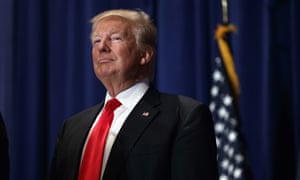
Champion of ‘free speech’: Donald Trump at a campaign rally last week. Photograph: Evan Vucci/AP
Not so long ago it was “soundbites” that were thought to be corrupting political debate by reducing complex ideas to slogans. The 1988 US presidential election was called the “soundbite election” by some commentators, the most famous example being George HW Bush’s promise: “Read my lips: No new taxes.” (Two years later Bush agreed to a bipartisan budget that did increase taxes.) It was a mysteriously brilliant piece of verbal engineering. Why would you have to read Bush’s lips when you could hear what he was saying on the TV? But the surprising image and arresting rhythm made it stick.
Soundbites and slogans (“Take Back Control”) still work. Trump, too, has a conventional campaign slogan: “Make America Great Again”. (Great how, exactly? By doing what? Don’t ask.) But he gets most publicity for his antic, apparently off-the-cuff remarks that rhetorically perform an absence of rhetoric. His real genius might be read as a satirical absolutism about the first amendment. If speech is genuinely free, there should be no consequences to speech whatsoever. And, to the mystification of the commenting class, this is what Trump repeatedly finds to be the case.
After the media furore surrounding Trump’s claim that Obama founded Isis, he tweeted: “THEY DON’T GET SARCASM?” Thus he rows back from any outrageous claim dreamed up by a brain that works like a cleverly programmed internet meme-generator. “I don’t know,” he says, all innocence, “that’s what some people are saying.” (No one was before he did.) Yet the idea Obama is the founder of Isis will stick in at least some voters’ minds come polling day, as will the imaginary Mexican wall (though they will probably have forgotten its “big beautiful door”) – just as the “£350m a week for the NHS” promise did for many Leave voters.
Trump is not a perversion of the tradition of political campaigning; he is the logical culmination of it. It doesn’t matter what you say, if it helps you get elected. Trump is not a liar, exactly, but a bullshitter. According to the canonical definition by the philosopher Harry Frankfurt, a liar still cares about the truth because he wants to conceal it from you. A bullshitter, on the other hand, simply doesn’t care what is true at all.
Trump is merely the most energetic current exploiter of a fact that modern politicians have long known: the media is broken, and you can mercilessly exploit its flaws to your own benefit. (That, after all, is what “spin doctors” are for.) If you repeat a lie often enough, then that claim becomes the story, and it’s what most people remember. And a structural confusion between “impartiality” and “balance” undermines the mission to inform of institutions such as the BBC. To be impartial would be to point out untruths wherever they come from. But to be “balanced” is to have a three-way between a presenter and two economists on opposite sides of some question. Never mind that one economist represents the views of 95% of the profession and the other is an ideologically blinkered outlier: the structure of the interview itself implies to the audience that the arguments are evenly divided.
In the age of social media, moreover, dubious political claims are packed into atomised fragments and attract thousands of enthusiastic retweets, while the people who help to redistribute them are unlikely ever to see a rebuttal that comes later or in someone else’s timeline. We’ve all moved on.
Social media is less a conversation than it is a virtually distributed riot of “happy firing” (a term for the celebratory shooting of assault rifles into the sky). That lies can go viral more quickly than the truth is another old observation. In 1710 Jonathan Swift wrote: “Falsehood flies, and the Truth comes limping after it.” But what is certain is that Twitter and Facebook now help it fly faster and further than ever before.
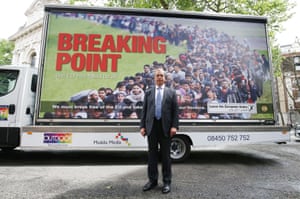
Nigel Farage proved the power of powerful slogans and images during the EU referendum campaign. Photograph: Philip Toscano/PA
Because attention is the currency of social media, public figures are incentivised to use outrage to vie for visibility, which further coarsens the public discourse – as when the American shock-journo Ann Coulter lately defended Trump by calling him a “victim of media rape” who is being blamed for “wearing a short skirt”. Any such outburst these days, along with the wave of overt post-Brexit racism in Britain, may be defended as a healthy refusal to kowtow to “political correctness”, a term that originally denoted the careful use of language so as not to needlessly upset people, and now just means common decency.
What, then, is to be done? The modern bullshitting demagogue succeeds because he says arresting and often amusing things that cut through the anomie of those who feel left behind by politics as usual. Exquisitely reasoned liberal conversation is exactly what turns those voters off. Lately it has been notable that Hillary Clinton, not previously considered the wittiest person in US politics, has used an impressive array of scripted zingers to put down her opponent. What the bullshitters do so well is define the rules of the game, so perhaps their opponents will have to play it at least to this extent, while trying to keep the moral high ground by still caring about what is true and what isn’t.
It’s not an edifying thought, but if the insurgent right is to have its Trumps and its Farages, maybe the centre and the left need their own versions too.
Friday, 19 February 2016
We need a new language to talk about the economy - With determined effort, the terms in which policies get discussed can be changed.
Banks trembling, shares tumbling and gathering fears of a new slump. The start of 2016 has been chilling for a global economy that has still to shake off the crisis of 2008. Worse, there is no agreement on what to do should the worst happen again. The big ideas that might make a difference – targeting higher inflation, printing money to give consumers something to spend with, or ploughing serious public funds into infrastructure – remain too contentious for politicians to voice out loud. That is a shame, because history suggests that the words they use matter.
Of course policies and theories have to pass muster, but just as significant in determining which ones end up being pursued are the language in which they are discussed. A smart metaphor can do more to shift the sense of the possible than the negative interest rates that increasingly desperate central bankers are relying on to alter the mood.
From economics seminar rooms to rage-pumped Donald Trump rallies there is a consensus on one thing: we need to do better next time. The last recession was followed by years of anaemic growth and squeezed pay, and taxpayers saddled with the bill for bailing out the banks. Nobody is going to be thrilled with that mix, but the despair is most acute on the left.
A crisis caused by footloose finance and preceded by decades in which the rich had raced ahead of the rest might have ushered in a new order of stability and fair shares. Instead we have quantitative easing – which puffs up asset prices for the haves and renders homes less affordable for the have-nots – and fiscal austerity, which makes the poor poorer and also leaves them more exposed, by knocking down the old storm defences of the welfare state. In the US, the top 1% grabbed more than half the total growth in the first five years of recovery, while in the UK, George Osborne, a chancellor who saw no choice to imposing the bedroom tax, still found room to trim the tax rate on top incomes.
None of this should have been possible, but it was successfully sold as necessary. To understand how, we must reckon with the deep foundations of economic orthodoxy in our culture, especially the language.
It was, RH Tawney explained, the genius of the Reformation, the ideological revolution that readied the way for capitalism, to reimagine the “natural frailty” of human greed “into a resounding virtue”. Whereas poverty, in medieval religious theory at least, had been next to godliness, early modern thinkers from Hobbes to Smith equated wealth with worth. Trade became respectable, and lending money for profit, which had been sinful usury, became a fruitful outlet for thrift. Credit became interwoven with honour and pride, while debt was shot through with weighty moral obligations.
These are the orthodox financial prejudices that have, with brief exceptions, held sway ever since – in Gladstone’s red box as much as Thatcher’s handbag. When the 2008 economic storm hit (a metaphor which itself does ideological work, implying an act of nature rather than a crisis of human folly) the then shadow chancellor Osborne reached for a tried and tested script. “The cupboard is bare,”he sternly announced, likening bankrupt Britain to an over-indebted home.
Economists have objected to lazy comparisons between domestic and national finances for the best part of a century: governments can tax, grow or even print their way out of debt, three important escape routes not open to individuals. In the 30 years after the second world war there were deficits in all but six. But far from this leaving Britain’s cupboard bare, the national debt dwindled from 250% to 50% of GDP.
So the household metaphor is deeply misleading but it remains irresistible to politicians and powerful with the public. It offers a way to make sense of the otherwise baffling billions in national debt through analogy with everyday experience. Furthermore, explains Jonathan Charteris-Black, an expert on rhetoric at the University of the West of England, it embeds “one of the most widely used of all political images: the nation as family, with the government as responsible parent”.
It is all so familiar that only restless, malcontent minds will argue back against the claim that There Is No Alternative. But the awkward squad should not lose heart: with determined effort, the terms in which policies get discussed can sometimes be changed. One modest example was the one-off charge made on the utilities soon after Labour came to power in 1997. Few taxes are popular, but by being badged a “windfall levy” this one came to be seen as a fair way to share good fortune that had dropped into the lap of these firms.
Looking further back, Keynes was a master of the disruptive metaphor. He described the “animal spirits” of investors whose rationality he questioned, and dismissed the self-styled “wolves and tiger” of industry as pathetically “domesticated” beasts. He was even credited with livening technical debate about the efficacy of monetary policy in a liquidity trap by talking of “pushing on a piece of string”. Keynesians across the Atlantic, such as Lauchlin Currie, rationalised the deficits of Roosevelt’s New Deal as “pump priming” the economy. The image here is of an old-fashioned well, where you have to pour in a little fluid to clear air from the valve, which then allows you to pump out a far larger volume of water. It had intuitive appeal for the very many Americans who had then been raised on farms, but hydraulics remains a promising source of imagery. Where orthodox economics and the moralising that goes with it emphasises solid “stocks”, assets and liabilities of particular values – a nasty debt, a nice nest egg or indeed an empty cupboard – the real economy operates through continuous “flows” of payment and activity.
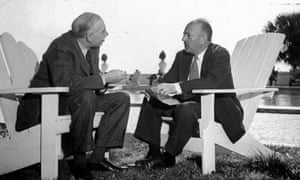
John Maynard Keynes with Harry Dexter White in 1946. ‘Keynes was a master of the disruptive metaphor.’ Photograph: Thomas D McAvoy/Time & Life Pictures/Getty Image
The engineer-turned-economist Bill Phillips illustrated this insight by building a marvellous machine that shunted coloured water about to illustrate how the components of national income related to one another. But there is no need to go to the lengths of constructing a physical metaphor to make the point about how the bubbling stream of a healthy economy can wash away the debris of debt. Or, indeed, how decisive interventions can be required to clear blockages in the arteries of finance.
The question endlessly put to the Labour opposition is whether it can put together a “credible, costed package of alternative economic plans”, and doing that will, of course, have to be part of the answer – but only part. For no such programme, whether it stacks up or not, will compete with Osborne’s until the public can be persuaded to talk about the economy differently.
John McDonnell, the shadow chancellor, has put great effort into assembling brainy economists to help refine his detailed commitments, but the results of their deliberations will likely attract even less attention than his one rhetorical flourish to date – “socialism with an iPad”. A creative writing competition might do more to help him prevail in the battles ahead.
Tuesday, 21 October 2014
‘Cleansing the stock’ and other ways governments talk about human beings

